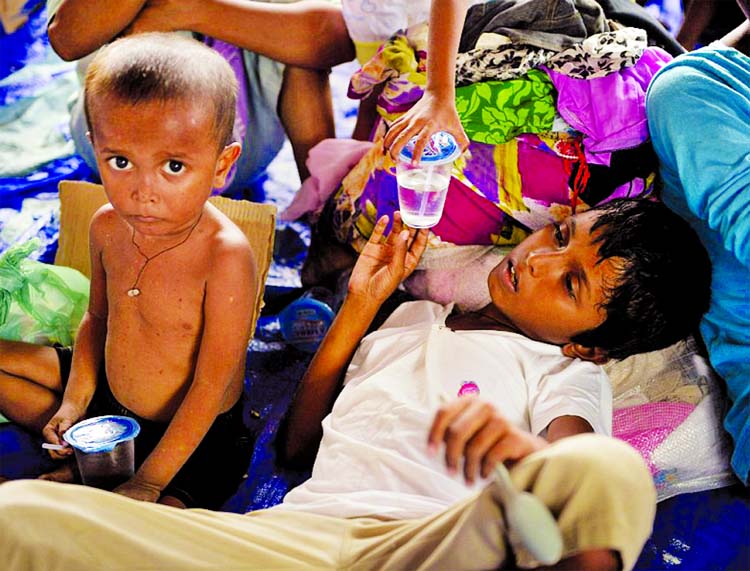
Feeding Rohingya refugees has become a big challenge for the government following drops in food supply from both local aid groups and international agencies.
Sources said, the administration was receiving 500 metric tons of foodstuffs on an average per day. But the supply now comes down to alarming 100 metric tons per day posing the challenge.
More than 600,000 Rohingya refugees have arrived in Bangladesh since August 25 this year, almost 60 per cent of whom are children, fleeing violence in Myanmar’s Rakhine state.
Refugess, especially the children, who arrived in Bangladesh were dehydrated and malnourished.
Sources said malnutrition among the Rohingya children in the camps of Cox’s Bazar has reached life-threatening levels due to insufficient food intake.
The UN’s children’s agency UNICEF earlier claimed that nearly 7.5 per cent of the children crammed into one of the camps in Bangladesh’s Cox’s Bazar district were at risk of dying from severe malnutrition.
“With more arriving, feeding all the refugees has become a big challenge for local authorities amid drops in food supply. Lack of enthusiasm from
local and global aid agencies may be the reason of supply shortage,” Md Nikaruzzaman, Upazila Nirbahi Officer of Ukhiya told The New Nation yesterday.
He admitted that local administration were receiving over 500 metric tons of food supply per day from various agencies, but now it dropped to 100 metric ton.
“Current supply is not enough to feed all the refuges,” said Md Nikaruzzaman.
Relief is being distributed through 12 points at Ukhiya and Teknaf under the supervision of Bangladesh army from 8am to 4pm. Due to short supply, relief distribution time has been fixed from 12am to 4pm, sources said.
“Rohignya camps are beset with food crisis along with heath hygiene problem,” Arif Hossain, a local right activist, told The New Nation yesterday.
He said, with food stocks rapidly diminishing and refugee numbers increasing, situation is taking a different turn.
“Refugess would face dire consequences if adequate food supply is not ensured for them. Adequate food aid and other resources only can save the life of the displaced Rohingya people and to check greater human sufferings.
Arif Hossain urged the local and international community to stand beside Bangladesh government ramping up emergency humanitarian assistance for the Rohingya refugees as well as to peaceful and permanent solution of the refuges crisis.
“The World Food Programme (WFP) will be entrusted with the task of relief distribution from December among the Rohingya people as much as necessary,” Md Ali Hossain, Deputy Commissioner of Cox’s Bazar District, told The New Nation yesterday.
“We’re working to handover the responsibility to the UN agency by this time,” he added.
The WFP earlier expressed serious concern about the high malnutrition rates among Rohingya refugees in Cox’s Bazar.
The WFP is meeting emergency food needs for nearly 700,000 Rohingya, supplying nutrient-rich biscuits to new arrivals and feeding registered residents with regular distributions of rice, vegetable oil, and lentils.
Meanwhile, Rohingya children, who fled their homes in Rakhine State of Myanmar, have narrated their terrifying experiences in a new report released by Save the Children.
“Many of the children, who arrived in Bangladesh since August 25, have faced systematic violence, rape and forced evictions,” said Save the Children in Bangladesh’s country director Mark Pierce in a media release on Friday.
“These children, who have endured so much suffering, were desperate with no place to go,” Mark Pierce said adding that it is only thanks to the Government of Bangladesh that these children might one day have the chance to lead happy lives.”
Shadibabiran, a 16-year-old girl and one of the victims, told Save the Children staff that some soldiers took me and two other girls into a house. “They hit me in the face with a gun, kicked me in my chest and stamped on my arms and legs. Then I was raped by three soldiers. They raped me for about two hours and at some stage I fainted.”
The soldiers broke one of her ribs, Shadibabiran said. “It was very painful and I could hardly breathe. I still have difficulty breathing, but I haven’t been to a doctor as I feel too ashamed.”
Twenty-four-year-old Rehema revealed how she had witnessed a woman and a baby being burnt alive.
“I saw a soldier pour gasoline over a heavily pregnant woman. Then he set her on fire,” she said. “Another soldier ripped a baby from his mother’s arms and threw him into the fire. His name was Sahab and he was not even one year old. I will never forget their screams.” The humanitarian agency was also grateful to be able to immediately respond to the influx of Rohingya families fleeing into Bangladesh.
Piece said Save the Children was on the ground and scaling up their response days after August 25.
“Having read the horrific accounts in this report, I am so grateful for the ongoing support of the local, national and global communities. Together, we will protect and nurture Rohingya children who have already endured so much,” he said. The real names of the victims were changed to protect their identity.

